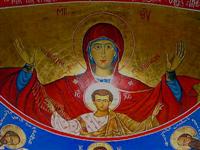 This week, Orthodox Christians gather together in the evenings to pray The Great Canon together. St. Andrew of Crete wrote The Great Canon around the year 700. The heavy words of this prayer reflect the human experience, help us look into our hearts honestly, and can lead us to becoming better people, more spiritual and more human. We all sin, turning away from God, who is the source of life. Sin produces darkness and confusion within us. We need to repent, turn around back toward God, to find true life. The sins we commit are like self-inflicted wounds that injure us deep within, but through repentance (turning away from the death within us toward our life-giving God), we can begin walking back toward the One who heals us and restores our beauty. With our whole hearts and minds, let us pray:
This week, Orthodox Christians gather together in the evenings to pray The Great Canon together. St. Andrew of Crete wrote The Great Canon around the year 700. The heavy words of this prayer reflect the human experience, help us look into our hearts honestly, and can lead us to becoming better people, more spiritual and more human. We all sin, turning away from God, who is the source of life. Sin produces darkness and confusion within us. We need to repent, turn around back toward God, to find true life. The sins we commit are like self-inflicted wounds that injure us deep within, but through repentance (turning away from the death within us toward our life-giving God), we can begin walking back toward the One who heals us and restores our beauty. With our whole hearts and minds, let us pray:Come, wretched soul, with thy flesh to the Creator of all. Make confession to Him, and abstain henceforth from thy past brutishness; and offer to God tears of repentance.
Have mercy on me, O God, have mercy on me.
I have rivaled the transgression of Adam, the first-formed man, and I have found myself stripped naked of God, of the eternal Kingdom and its joy, because of my sins.
Have mercy on me, O God, have mercy on me.
Woe to me, miserable soul! How like thou art to the first Eve! For thou hast looked in wickedness and wast grievously wounded; thou hast touched the tree and rashly tasted the deceptive food.
Have mercy on me, O God, have mercy on me.
Instead of the visible Eve, I have the Eve of the mind: the passionate thought in my flesh, showing me what seems sweet; yet whenever I taste it, I find it bitter.
Have mercy on me, O God, have mercy on me.
I confess to Thee, O Savior, the sins I have committed, the wounds of my soul and body, which murderous thoughts, like thieves, have inflected inwardly upon me.
Have mercy on me, O God, have mercy on me.
Though I have sinned, O Savior, yet I know that Thou art full of loving-kindness. Thou dost chastise with mercy and art fervent in compassion. Thou dost see me weeping and dost run to meet me, the Father calling back the prodigal son.
Have mercy on me, O God, have mercy on me.
I offer to Thee, O merciful Lord, the tears of the harlot. Take pity on me, O Savior, in Thy compassion.
Have mercy on me, O God, have mercy on me.
With the lusts of passion I have darkened the beauty of my soul, and turned my whole mind entirely to dust.
Have mercy on me, O God, have mercy on me.
I have torn the first garment that the Creator wove for me in the beginning, and now I lie naked.
Have mercy on me, O God, have mercy on me.
I have lost the beauty and glory with which I was first created; and now I lied naked and ashamed.
Have mercy on me, O God, have mercy on me.
I have adorned the idol my flesh with a many-colored coat of shameful thoughts, and I am condemned.
Have mercy on me, O God, have mercy on me.
I have cared only for the outward adornment, and neglected that which is within—the tabernacle fashioned by God.
Have mercy on me, O God, have mercy on me.
With my lustful desire I have formed within myself the deformity of the passions and disfigured the beauty of my mind.
Have mercy on me, O God, have mercy on me.
I have discolored with the passions the first beauty of the image, O Savior. But see me, as once Thou hast sought the lost coin, and find me.
Christ said, “Or what woman, having ten silver coins, if she loses one coin, does not light a lamp and sweep the house and seek diligently until she finds it? And when she has found it, she calls together her friends and neighbors, saying, ‘Rejoice with me, for I have found the coin which I had lost.’ Just so, I tell you, there is joy before the angels of God over one sinner who repents” (Luke 15.8-10, RSV).
Photo of an icon of Christ by Dana S. Kees. The above selections from The Great Canon, also known as The Canon of St. Andrew of Crete are found in The Lenten Triodion, Trans. by Mother Mary and Bishop KALLISTOS, Great Compline for Monday and Tuesday of the First Week of Lent (South Canaan, PA: St. Tikhon’s Seminary Press, 2001). These selections are printed, with commentary, in First Fruits of Prayer: A Forty-Day Journey Through the Canon of St. Andrew of Crete by Frederica Mathewes-Green (Brewster, MA: Paraclete Press, 2006), Chapters 1, 5, & 6. The passage from Holy Scripture is from the Revised Standard Version.






